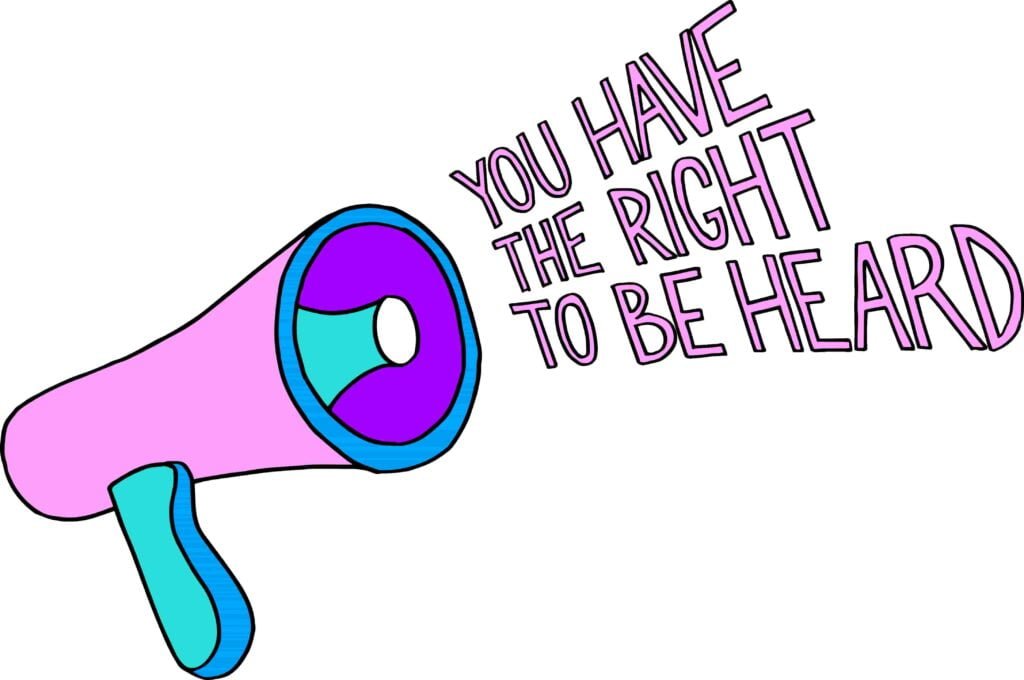The right to be heard is a fundamental human right that serves as a cornerstone of democratic societies worldwide. It is a crucial element of the broader concept of freedom of expression, enabling individuals to voice their opinions, concerns, and ideas without fear of reprisal or censorship. This right is enshrined in numerous international conventions and domestic legal systems, highlighting its significance in upholding democratic values and human dignity.

International Framework for the Right to Be Heard
The right to be heard is recognized and protected by various international agreements and declarations. Perhaps the most prominent of these is the Universal Declaration of Human Rights (UDHR), adopted by the United Nations General Assembly in 1948. Article 19 of the UDHR states, “Everyone has the right to freedom of opinion and expression; this right includes freedom to hold opinions without interference and to seek, receive, and impart information and ideas through any media and regardless of frontiers.” This provision emphasizes the importance of not only expressing one’s opinions but also ensuring that they are heard and respected.
Another crucial instrument is the International Covenant on Civil and Political Rights (ICCPR), which elaborates on the right to be heard. Article 21 of the ICCPR reaffirms the right of every citizen to participate in the conduct of public affairs, directly or through freely chosen representatives. This provision underlines the importance of public participation in decision-making processes and highlights the right to be heard as an essential component of democratic governance.
Domestic Protections for the Right to Be Heard
Countries around the world have incorporated the right to be heard into their legal and constitutional frameworks. For instance, the First Amendment to the United States Constitution protects freedom of speech and ensures that individuals have the right to express their views openly and without government interference.
In many democracies, similar provisions exist, safeguarding citizens’ right to express themselves freely. In the United Kingdom, the Human Rights Act 1998 incorporates the European Convention on Human Rights into domestic law, securing the right to freedom of expression and the right to be heard. This legal framework ensures that individuals can voice their opinions without fear of censorship or persecution.
The Role of Media and Technology
The advent of modern media and technology has expanded the avenues through which people can exercise their right to be heard.
Social media platforms, online forums, and citizen journalism have become powerful tools for individuals to express their views and connect with a global audience.
While these platforms have democratized the process of sharing information, they have also raised questions about the responsibility of governments and technology companies in ensuring that this right is not abused or curtailed.
Challenges and Limitations
While the right to be heard is fundamental to a democratic society, it is not without its challenges and limitations. Balancing this right with other competing rights, such as the right to privacy and the need to prevent hate speech or incitement to violence, is a complex task for legislators and policymakers.
In addition, marginalized groups may face obstacles in exercising their right to be heard. Discrimination, harassment, and economic disparities can limit the ability of certain individuals to participate fully in public discourse. Addressing these disparities is essential to ensure that the right to be heard is truly universal and inclusive.
Conclusion
The right to be heard is a foundational element of democracy and a core human right. It is enshrined in international law and protected by many domestic legal systems. With the advent of modern technology, the avenues for expressing one’s views have expanded, making it easier for individuals to participate in public discourse.
However, challenges and limitations exist, and it is essential for governments, civil society, and technology companies to work together to strike a balance between the right to be heard and the need to protect against harm and discrimination. In doing so, we can uphold the principles of democracy, empower marginalized voices, and ensure that the right to be heard remains a pillar of our societies.